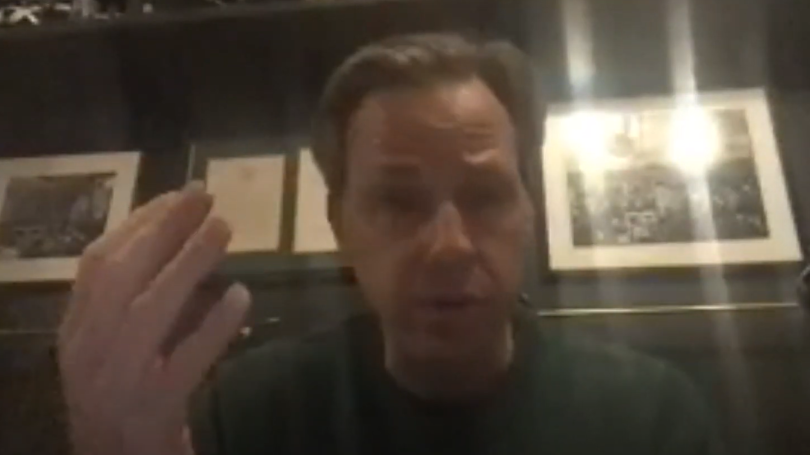
- Public Policy
- Leadership
- Funding
- News & Events
- About the Center
Back to Top Nav
Back to Top Nav
Back to Top Nav
Back to Top Nav
On November 12, 2020, the Rockefeller Center held a Post-Election Analysis Event with Jake Tapper ’91, Anchor and Chief Washington Correspondent at CNN. Hosted by Rockefeller Center Director Jason Barabas ’93, and moderated by Professor Charles Wheelan ’88, Tapper gave his insights on the coverage and outcomes of the 2020 election, the future of journalism and political strategy, and advice to students currently navigating the global pandemic.
Tapper began by noting just how vastly election coverage, and journalism more broadly, has evolved over the past five years due to the increasing presence of both misinformation and disinformation. “In no other part of American society would this be allowed but in politics,” he argued, noting the dangerously increasing presence of blatant falsehoods spread by those with political power. Meanwhile, journalists, Tapper explained, have had to carefully adapt to address these falsehoods in a manner that suits the standards of both journalists and the consumers of journalism. Often, he said, journalists have been reluctant to use what he calls the “L-word” in the face of false statements because how difficult it is to determine whether someone is deliberately lying or simply not as well-informed. Instead, Tapper explained, in the face of an inaccuracy, a journalist would “give the benefit of the doubt,” respond “that’s not true” and respectfully explain why in hopes that the inaccuracy was purely unintentional. However, citing the “Overton window,” a theory in political science dictating when certain policy issues are considered appropriate to discuss at the mainstream level, Tapper acknowledged that the “window” on “calling someone a liar within the world of journalism has evolved” to the point where many journalists are now willing to be more explicit and direct in the presence of a falsehood. “Never before in my career,” Tapper emphasized, “has anyone been confronted with this much mendacity.”
However, Tapper noted, “there still isn’t in journalism, and in politics, the widespread ability to just call things out, which is disappointing,” he said, referencing the fact that many Republicans have gotten away with refusing to formally acknowledge Joe Biden as the President-elect. Furthermore, Tapper remarked, journalists should continue to “do more” to help people make informed decisions about policy issues, explaining that during the 2020 election cycle, he strived to cover more issues of substance than in 2016, and “explain what [these issues] mean in terms of people’s actual lives.” On the other hand, he said, the public also needs to be the change they want to see, and actively participate in electing officials and shining light on issues they want to see journalists and government focus on. “The public,” Tapper stressed, “needs to demand, from its journalists and its elected officials, an allegiance to the truth.”
Turning to the 2020 election in particular, Wheelan noted the surprising contrast between the political alignment of local referendum and national results in certain states; while Trump won in Florida, the state also voted to increase the minimum wage to $15 per hour by 2026. Similarly, California, which Biden won, also rejected a referendum that would, among other things, reinstate the use of affirmative action. In response, Tapper suggested that, in contrast to the impression that there are no longer “ticket-splitters” in America, the populist vote may be of increasing importance in both national and local politics. Noting the dichotomy between the “cultural phenomenon of what Trump stood for” and the “the populist phenomenon of what he said he stood for,” Tapper suggested that a cabinet nomination, such as that rumored for Bernie Sanders as Secretary of Labor, could work in President-elect Biden’s favor and potentially “wrest the mantle of populism back from Trump.” Wheelan agreed, noting that many policies such as the minimum wage and workers’ rights could turn into policies co-authored by both Democrats and Republicans, and that both parties are ultimately “still searching for the playbook.”
Tapper concluded by sharing his own career path and gradual transition into the world of journalism after briefly attending film school and working on a family member’s political campaign. “The lesson I would give more to students is just the perseverance and the knowledge that I got rejected a billion times, and there was just setback after setback after setback…” Tapper explained. “Work, show the world why they should hire you… and just don’t take rejection personally, and keep going. I promise it’ll pay off.”
And his advice on surviving school in a global pandemic? “The best thing I can say about being a college student in 2020 is that I swear it’ll get better,” Tapper said. “Don’t be discouraged, there is a light at the end of the tunnel.”
-- Written by Shawdi Mehrvarzan’22, Rockefeller Center Student Program Assistant for Public Programs
Rocky Talk Podcast w/ Jack Tapper ‘91: Apple Podcasts and Spotify.